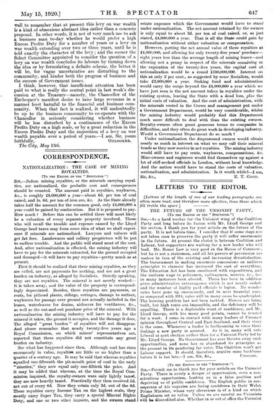CORRESPONDENCE.
NATIONALIZATION: THE CASE OF MINING ROYALTIES.
tTo THE EDITOR OF THE "SPECTATOR"]
SIR,—Before mining royalties, or the minerals carrying royal- ties, are nationalized, the probable cost and consequences should be counted. The amount paid in royalties, wayleaves, &c., is roughly £8,000,000 a year—about 6d. per ton of coal raised, and is. 6d. per ton of iron ore, &c. As the State already takes half the amount for the common good, only £4,000,000 a year could be gained by confiscation. But it is proposed to pay. How much ? Before this can be settled there will most likely be a valuation of every separate property involved. Those who will recall the trouble and expense caused by the Lloyd George land taxes may form some idea of what we shall experi- ence if minerals are nationalized. Lawyers and valuers will get fat fees. Landowners and colliery proprietors will be put to endless trouble. And the public will stand most of the cost. And, after nationalization is effected, the mining industry will have to pay for the minerals extracted, for the ground occupied and damaged-it will have to pay royalties—pretty much as at present.
First it should be realized that these mining royalties, as they are called, are not payments for nothing, and are not a great burden on industry, as alleged by Socialists. Strictly speaking, they are not royalties. The mineral is not merely worked— it is taken away, and the value of the property is correspond- ingly depreciated. Besides, these royalties are payments, or rents, for pithead plants, sidings, cottages, damage to surface, wayleaves for passage over ground not actually included in the leases, waterleaves for drains, airleaves for ventilators, &c., as well as the out-and-out purchase price of the mineral. With nationalization the mining industry will have to pay for the mineral it takes, the ground it occupies, and the damage it does. The alleged "great burden" of royalties will not disappear. And please remember that nearly twenty-five years ago a Royal Commission, on which miners' representatives sat, reported that these royalties did not constitute any great burden on industry.
gee what has happened since then. Although coal has risen
enormously in value, royalties are little or no higher than a quarter of a century ago. It may be said that whereas royalties equalled one-fifteenth the pit-mouth price of coal in the early "nineties," they now equal only one-fiftieth the price. And it may be added that whereas, at the time the Royal Com- mission inquired, the royalty-owners were only lightly taxed, they are now heavily taxed. Practically they then received 5d. net out of every 6d. Now they 'retain only 3d. out of the 6d. These royalties carry Income Tax on the highest scale, they mostly carry Super Tax, they cany a special Mineral Rights Duty, and one or two other imposts, and the owners stand
estate expenses which the Government would have to stand under nationalization. The net amount retained by the owners is only equal to about 3d. per ton of coal raised, or, as just stated, 5,4,000,000 a year. That is all the State could gain by nationalization without either valuation or compensation.
However, putting the net annual value of these royalties at 14,000,000, and allowing for only twenty-five years' purchase-- eight years less than the average length of mining leases—and allowing not a penny in respect of the minerals remaining at the expiration of the twenty-five years, the capital cost of: nationalization would be a round £100,000,000. Interest on this at only 3 per cent., as suggested by some Socialists, would: take 5.3,000,000 a year. Sinking fund and administration- would carry the outgo beyond the £4,000,000 a year which we have just seen is the net amount taken in royalties under the existing system, leaving the State with a dead loss, plus the initial costs of valuation. And the cost of administration, with the minerals vested in the Crown and management put under a Government Department, would be very considerable, whilst the mining industry would probably find thia Department much more difficult to deal with than the existing owners. Royalty-owners often grant generous terms to companies in difficulties, and they often do great work In developing industry. Would a Government Department do so much ?
Under nationalization the dispossessed owners would obtain nearly as much in interest on what we may call their mineral, bonds as they now receive in net royalties. The mining industry would still have to pay rents, wayleaves, compensations, &c. Mine-owners and engineers would find themselves up against a lot of stiff-necked officials in London, without local knowledge. And the nation would have to stand the costs of valuation, nationalization, and administration. Is it worth while?---I am,










































 Previous page
Previous page